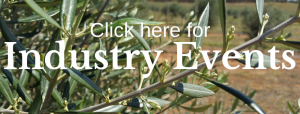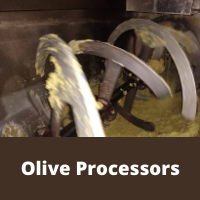The ABC’s 7.30 Report on 6 October focused on the Australian olive industry with news of the test results of 12 oils (nine imported and three Australian major supermarket brands). AOA President Paul Miller, and Dr Rod Mailer were interviewed at length, along with DAFF Minister, Tony Burke, and ACCC boss, Graeme Samuel.
The AOA released this statement before the program aired.
The Australian Olive Association (AOA) has developed an industry Code of Practice to better support quality, authenticity and confidence in the Australian olive industry.
The Australian Olive Association was founded in 1995 as the industry body to encourage research and dissemination of information and the sustained development of a national olive industry in Australia.
The Association’s Code of Practice aims to provide security and confidence to consumers and investors in Australia and overseas that certified Australian olive products meet the highest industry standards. To be certified by the Code of Practice, products must be Australian and undergo organoleptic (taste) and chemical testings.
In conjunction with the Code, the Association is undertaking marketplace surveillance of olive oils to ensure the truthfulness of claims made on product labels.
At this stage, the Code and marketplace surveillance are based on the Codex Alimentarius Standard, IOC Standards (European standards) and the recently developed German standards.
Under these standards, 12 oils (nine imported and three Australian major supermarket brands) labelled as extra virgin olive oil were independently tested by the Australian Oils Research Institute, NSW Department of Primary Industries.
All Australian olive oils passed all tests indicating that they are authentic, high quality extra virgin olive oils.
The Association defines extra virgin olive oil as the natural oil from quality olives that have been picked straight off the tree and extracted as soon as possible without the use of chemicals or excessive heat. This ensures that the oil’s remarkable health benefits, flavour and freshness are maximised.
Test results also showed that six of the nine imported oils failed the international and German standards, which indicates that the oils labelled as extra virgin are not extra virgin. The other three imported oils failed the German standards only, which indicates that the oils are of inferior quality and also not extra virgin by those tests.
The German standards were presented at the 2008 American Oil Chemists’ Society (AOCS) Annual Meeting and aim to better authenticate olive oil and describe its quality. It is the Association’s immediate objective to adopt these standards as the Australian olive industry standards and ultimately have these standards adopted as the official Australian standards for olive oil.
The Australian Olive Association is committed to developing an olive industry where consumers’ interests are placed first with regard to freshness, taste and quality.
In 2008, Australia produced approximately 12,000 tonnes of olive oil and it is expected that this production will double within the next five years, meeting the rising consumer demand internationally. Export sales of Australian olive oil were valued at over $16 million in 2007.
Australian olive oils are almost entirely truly extra virgin olive oils.


